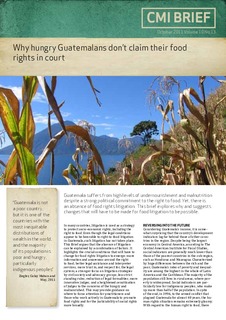Why hungry Guatemalans don't claim their food rights in court
Report
Permanent lenke
http://hdl.handle.net/11250/2474882Utgivelsesdato
2011-10-28Metadata
Vis full innførselSamlinger
- Publications [1488]
Originalversjon
Bergen: Chr. Michelsen Institute (CMI Brief vol. 10 no. 13) 4 p.Sammendrag
Guatemala suffers from high levels of undernourishment and malnutrition despite a strong political commitment to the right to food. Yet, there is an absence of food rights litigation. This brief explores why and suggests changes that will have to be made for food litigation to be possible. In many countries, litigation is used as a strategy to protect socio-economic rights, including the right to food. Even though the legal conditions appear to be favorable to right-to-food litigation in Guatemala, such litigation has not taken place. This Brief argues that the absence of litigation can be explained by a combination of factors. It highlights the crucial conditions that will have to change for food rights litigation to emerge: more information and awareness around the right to food; better legal assistance and interpreter services; more trust in, and respect for, the legal system; a stronger focus on litigation strategies by civil society and advocacy groups; less strict standing rules; reduction of legal formalities; more innovative judges; and a heightened sensitization of judges to the concerns of the hungry and malnourished. This may provide guidance on where to focus attention for practitioners and those who work actively in Guatemala to promote food rights and for the justiciability of social rights more broadly.
